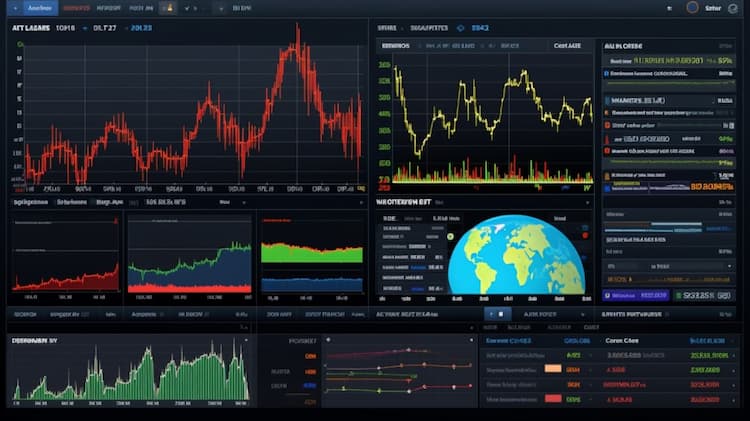
MTUM VS DWAS
Exchange-Traded Funds (ETFs) have become an essential part of modern investment strategies, offering a convenient and diversified way to access various market sectors and asset classes. In this article, we will conduct a thorough comparison between two prominent ETFs: MTUM (iShares MSCI USA Momentum Factor ETF) and DWAS (Invesco DWA SmallCap Momentum ETF). We will delve into key aspects such as ETF tickers, full names, issuers, sectors, top holdings, capitalization, investment strategy, tracking methods, and exposure.
MTUM Vs DWAS: Overview
MTUM and DWAS are two ETFs that focus on different segments of the market. MTUM aims to capture the momentum factor of large-cap U.S. stocks, while DWAS seeks to capitalize on the momentum of small-cap stocks. This fundamental difference in investment approach results in distinct risk and return profiles, which we will explore further in the subsequent sections.
MTUM Vs DWAS: Sectors and Top Holdings
MTUM's portfolio consists of stocks that exhibit strong momentum within the large-cap sector. On the other hand, DWAS is composed of small-cap stocks that display momentum characteristics. It's important to analyze the sectors and top holdings of these ETFs to understand their underlying exposure and potential vulnerabilities. MTUM may hold companies like Apple, Microsoft, and Amazon, while DWAS might include smaller companies with high momentum like Crocs, Carvana, and Enphase Energy.
 MTUM overlap MTUM VS DWAS
MTUM overlap MTUM VS DWAS
MTUM Vs DWAS: Capitalization and Investment Strategy
MTUM typically has a substantial asset under management (AUM) due to its focus on larger companies with established momentum. DWAS, as a small-cap ETF, generally has a lower AUM. MTUM's investment strategy revolves around selecting large-cap stocks that exhibit strong momentum indicators, while DWAS selects small-cap stocks with strong price trends. The differences in capitalization and investment strategy can significantly impact potential returns and risks associated with each ETF.
MTUM Vs DWAS: Tracking Methods and Exposure
MTUM seeks to track the MSCI USA Momentum Index, a benchmark that includes large-cap U.S. stocks with momentum characteristics. DWAS, on the other hand, follows the Dorsey Wright SmallCap Technical Leaders Index, which comprises small-cap stocks demonstrating strong technical momentum. The tracking methods and underlying indexes play a vital role in determining the performance and exposure of these ETFs. Understanding these nuances is crucial for investors looking to align their portfolio with their investment objectives.
Conclusion
In summary, the MTUM and DWAS ETFs offer distinct approaches to capturing momentum within the stock market, with one focusing on large-cap stocks and the other on small-cap stocks. Investors seeking to benefit from momentum investing should carefully consider their risk tolerance and investment goals before choosing between these two ETFs. For those interested in gaining deeper insights into the holdings, correlations, overlaps, and other relevant details of these ETFs, ETF Insider provides an excellent resource. This user-friendly app empowers investors with valuable information to make informed decisions.
Disclaimer: This article is intended for informational purposes only and does not provide any investment advisory services. Investors should conduct their own research and consult with financial professionals before making investment decisions.
Sources:
iShares. (n.d.). iShares MSCI USA Momentum Factor ETF (MTUM). Retrieved from https://www.ishares.com/us/products/239696/ishares-msci-usa-momentum-factor-etf
Invesco. (n.d.). Invesco DWA SmallCap Momentum ETF (DWAS). Retrieved from https://www.invesco.com/us/financial-products/etfs/product-detail?productId=etfs:dwasp
FAQ
Why is MTUM better than DWAS?
MTUM may be considered better than DWAS for some investors due to its specific focus, offering diversification.
Does DWAS beat MTUM?
DWAS's performance relative to MTUM will vary over time, depending on market conditions.
Should I invest in MTUM or DWAS?
The choice between MTUM and DWAS should align with your investment goals, risk tolerance, and desired exposure.
Are MTUM and DWAS good investments?
Both MTUM and DWAS can be suitable investments depending on individual investment strategies, goals, and risk profiles.
What is the correlation between MTUM and DWAS?
The correlation between MTUM and DWAS can vary over time, reflecting differences in performance.














